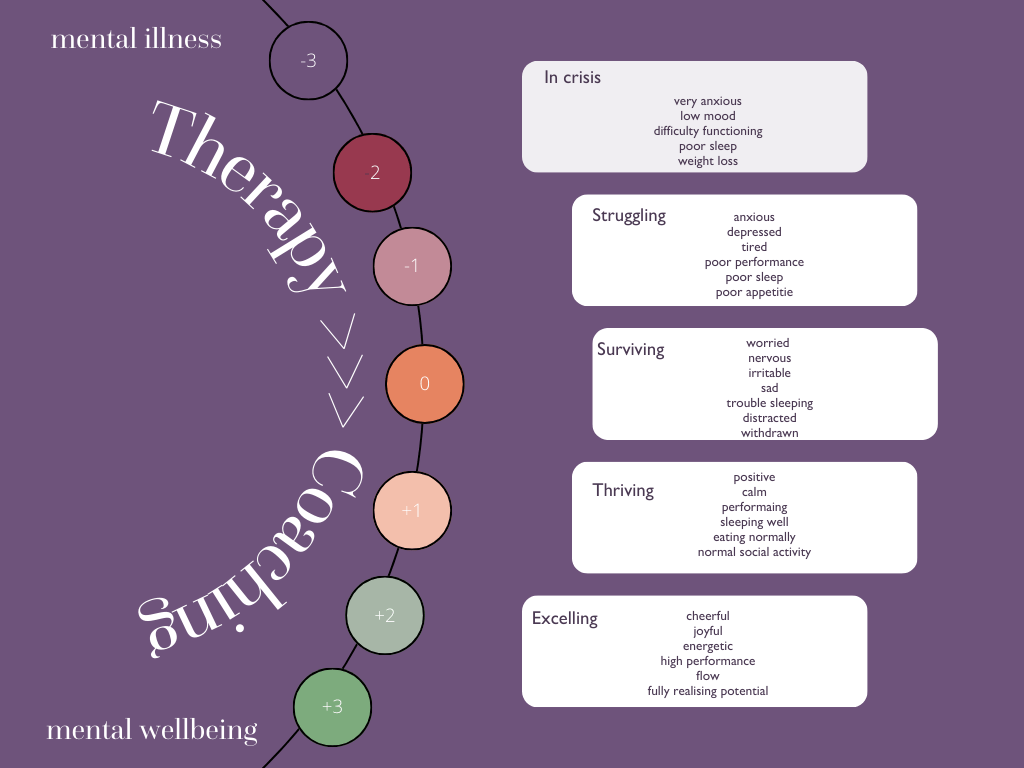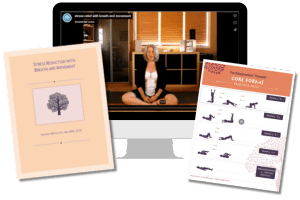As a business owner, how do you know whether you need a coach or a therapist?
How do you know whether a coach or a therapist is better for you as an entrepreneur?
- Something is not going right in your business.
- Or you feel like there are issues you should address so you, as a business owner, can feel better emotionally.
- You want to be a stronger and more balanced leader in your business and for your team.
- Or you find your stress is too high and can’t run your business as effectively.
- You want to refine your people skills because you find yourself engaged in too many conflicts.
- Or you want to access your creative problem-solving and strategic capacities.
Any number of scenarios can lead you, as an entrepreneur, to start looking for support. Coaches proliferate online, while therapists are in smaller supply. What is therapy anyway, and how is that going to help you as a business owner? But then shouldn’t every entrepreneur have a coach?
When you’re thinking of embarking upon a period of growth or transformation as a business owner, it can be difficult to wade through all the varieties of practitioners online to determine which one would best suit your needs.
Each profession has an important role to play in an entrepreneur’s support team. But what is that role and when do you need a coach and when do you need a therapist?
Context and Background
I am a registered social worker and have a Masters degree in counselling. I have professional training, experience and supervision in treating trauma, and am a Certified Clinical Trauma Professional. I also have coaching certificates from three different organizations: Tara Mohr’s The Coaching Way, The Driven Resilience Program and The Transformation Academy.
I have worked with business coaches and value their contribution to my business growth very deeply. I would not be where I am today if not for the support of the coaches I have hired.
I am firmly in support of coaching as a profession and encourage all my clients to work with a coach in addition to a therapist.
As a therapist trained in coaching skills, I needed to understand scope of practice for both coaching and therapy, as part of the requirements of my regulatory body. I undertook a study of the differences and participated in a number of trainings on differentiating between the two.
In addition, many people and even many prospective clients ask me about the differences between coaching and therapy.
These two circumstances have led to me write this article as a resource for folks visiting my site but also as a way to work out how to talk about the differences in a clear and respectful way.
Coaching and therapy: similarities and differences
The professions of coaching and therapy have areas of overlap, as well as important characteristics that distinguish them from one another.
Both coaches and therapists are helping professionals. They both serve human actualization, and they both support people in achieving better wellbeing. However, their work falls along a continuum from mental illness to optimum performance, with an area of overlap in the middle.

Similarities
Some therapists and some coaches both focus on changing behaviours. (This is especially the case for therapists working within the framework of Cognitive Behavioural Therapy (CBT) because it’s right there in the name.)
Both therapy and coaching work at the level of awareness of thoughts and behaviours as a way toward inner transformation and outer change.
Both therapy and coaching can be exploratory, with the practitioner holding space in which clients can become aware of thoughts and feelings about situations and experiences.
Differences
Where coaching and therapy differ significantly is with respect to focus.
Therapy is focussed on moving from emotional distress toward emotional wellbeing, and from mental illness toward mental health.
Therapy is psychological in nature, looking at personal and family history, experiences and patterns. In their work with clients, therapists refer to a body of academic literature and research that addresses human psychology and behaviour.
Outer change occurs as a result of and in tandem with inner insight and emotional processing.
Coaching focuses on setting and achieving goals.
Outer change occurs as the cumulative result of goal-oriented actions.
So while there are many fine distinctions which I will outline below, the emphasis or focus is on either growth or healing.
Coaching is growth; it is a process of taking steps to achieve a specific goal over a short(er) period of time. Therapy is a healing process that takes a long(er) time.
To summarize:
- Therapy focuses on restoring mental and emotional health and wellbeing.
- Coaching focuses on goals and performance.
- Therapy is focussed on emotions and process.
- Coaching is focussed on action.

Limits of professional practice and competence
Scope of practice is an important concept for both coaches and therapists. It is a framework within which we can understand the differences between coaching and therapy.
Scope of practice: what professionals are allowed to do
The Canadian Medical Protective Association provides the following definition of scope of practice that I find useful for this discussion.
Scope of practice is the range of tasks, decisions or activities of a qualified professional allowed by law and the provincial/territorial/state/federal licensing authority governing that profession.
Scope of practice is what you are allowed to do as a professional, under the law.
It’s important to note that a scope of practice is a general boundary and does not necessarily mean that an individual provider has the knowledge, skills, or professional experience to safely perform all allowed activities.
This is where scope of competence comes in.
Scope of competence: what professionals are trained to do
Scope of competence is a subset of the scope of practice.
Scope of competence includes aspects of the profession in which you can demonstrate competence, usually through formal training, education and certification.
It means you have the knowledge, skills or professional experience to safely perform a professional activity that you are allowed to practice under the law.
Professionals are responsible for limiting their practice to areas in which they have been trained and educated, in other words, in which they are competent.
Scope of competence is what you are trained to do within the larger, permitted, scope of practice.
So for example, in the province of Ontario, Registered Social Workers are allowed by law to provide psychotherapy, but not all Registered Social Workers are competent to do so.
For another example, psychologists, psychotherapists and social workers, generally speaking, are allowed by law to diagnose and treat mental illness, but not all of them are trained and qualified to do so.
All therapists (psychologists, psychotherapists and social workers) are allowed to treat trauma, but not all are competent to do so.
Similarly, coaches are trained to help people identify and set goals and move toward them, but not every coach is trained to do so in every area in which a person can be coached.
For example, business coaching requires the coach to have a certain set of knowledge about business operations, such as marketing, business planning, finances, etc. We would expect a fitness coach to have training in exercise physiology, kinesiology, sports psychology, etc. We would not expect a fitness coach to give us business coaching and vice versa.
Risk of harm
Harm is most likely to occur within scope of competence.
A trained therapist or a trained coach can encounter, within the helping or supportive relationship, issues that fall outside their training.
In my practice, people have brought up issues of sex and sexuality, gender identity, race and racialization. I have had clients with obsessive-compulsive disorder, and eating disorders, as well who were active in addiction to substances.
I am allowed, within my scope of practice as a registered social worker, to address these issues, but I am not trained or certified to do so.
I have anti-oppression training, and am engaged in ongoing learning in that area, so I’m less likely to cause harm when working with folks who experience oppressions, but it is not within my scope of competence to support a client’s therapeutic process in areas such as racialization, transgender issues, body image, etc.
Likewise, I have completed continuing education trainings in many areas of mental health and mental illness, but I am not competent to treat every mental illness.
When I encounter an issue that is outside my scope of practice or competence, I am required by the ethical code of my licensing body to refer to another, qualified practitioner. If I don’t, I can lose my license.
So while I support entrepreneurs with their emotional and psychological challenges, when they want support around business strategy and tactics, I will refer them to a business coach.
If I work with a business owner who has OCD, and they are experiencing challenges in that specific area, I will refer them to a mental health professional trained specifically in treating OCD.
In case you’re curious, here is information on the scope of practice of social work in Canada (where I’m located).
Coach or therapist: which is best for you as a business owner?
Below is a table outlining some of the finer distinctions between coaching and therapy that I have compiled in the course of my research.
This list is intended to give you an idea of the similarities and differences in order to support your decision-making, but is not exhaustive.
For example, I didn’t lay out all the minutiae of service delivery and pricing (e.g., length of sessions, platforms, etc.,), nor or of the various laws governing professional practice.
As I wrote this article, I experimented with laying this table out in many different ways so as not to weight it in favour of either profession.
I wanted it to be a decision-making tool, though, so for that purpose, it made more sense to organize it as it appears here.
Decision-making tool for choosing between a coach or therapist
This table can be used as a tool to help you in your decision-making. Click here to download the PDF. (No opt-in required.)
Circle the check beside each item you want.
When you’re done, total the number of circled checks under each column. Enter the total in the bottom row.
The column with the highest total circled checks is the best type of service to start exploring for the needs you have identified.



